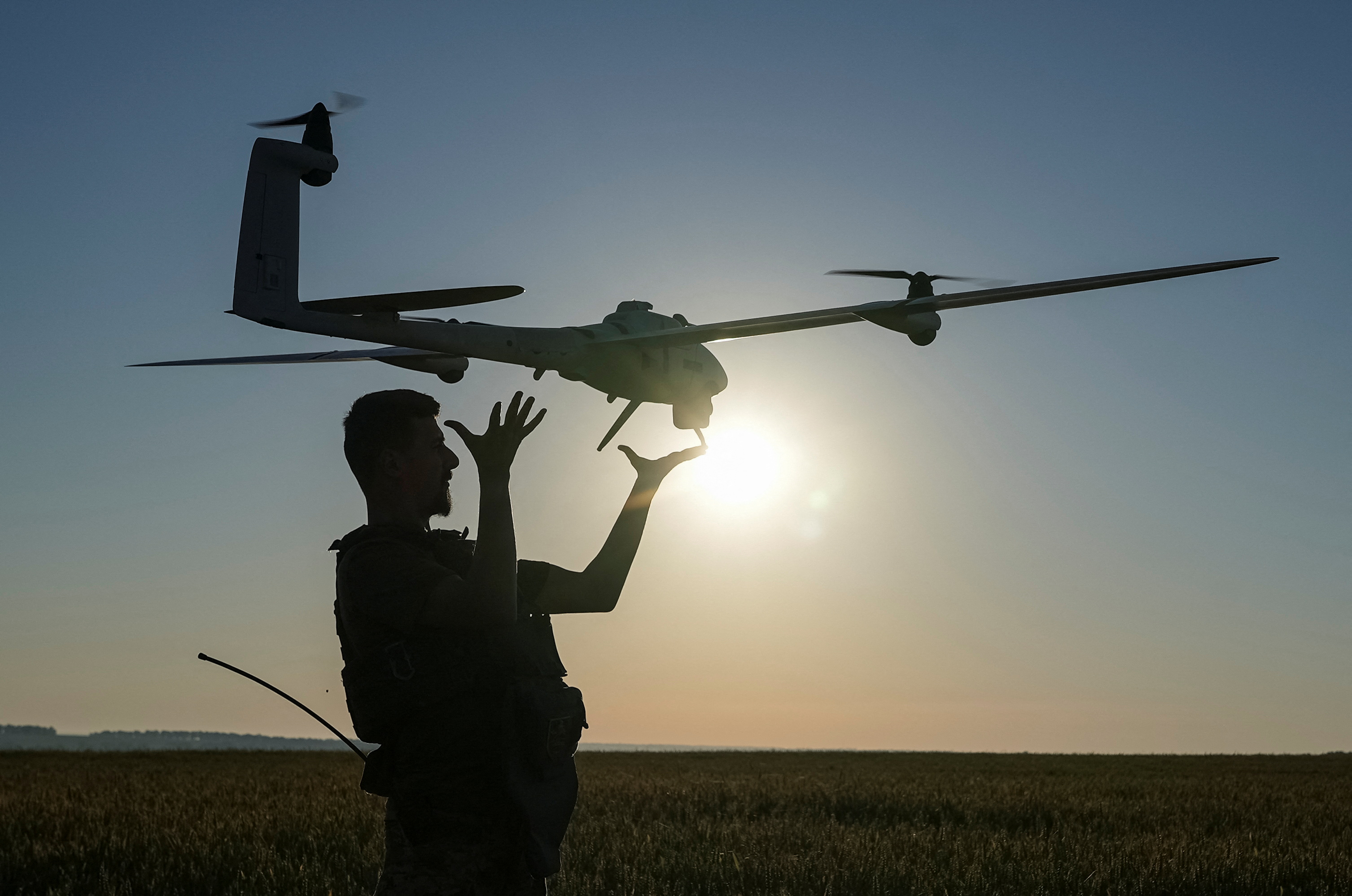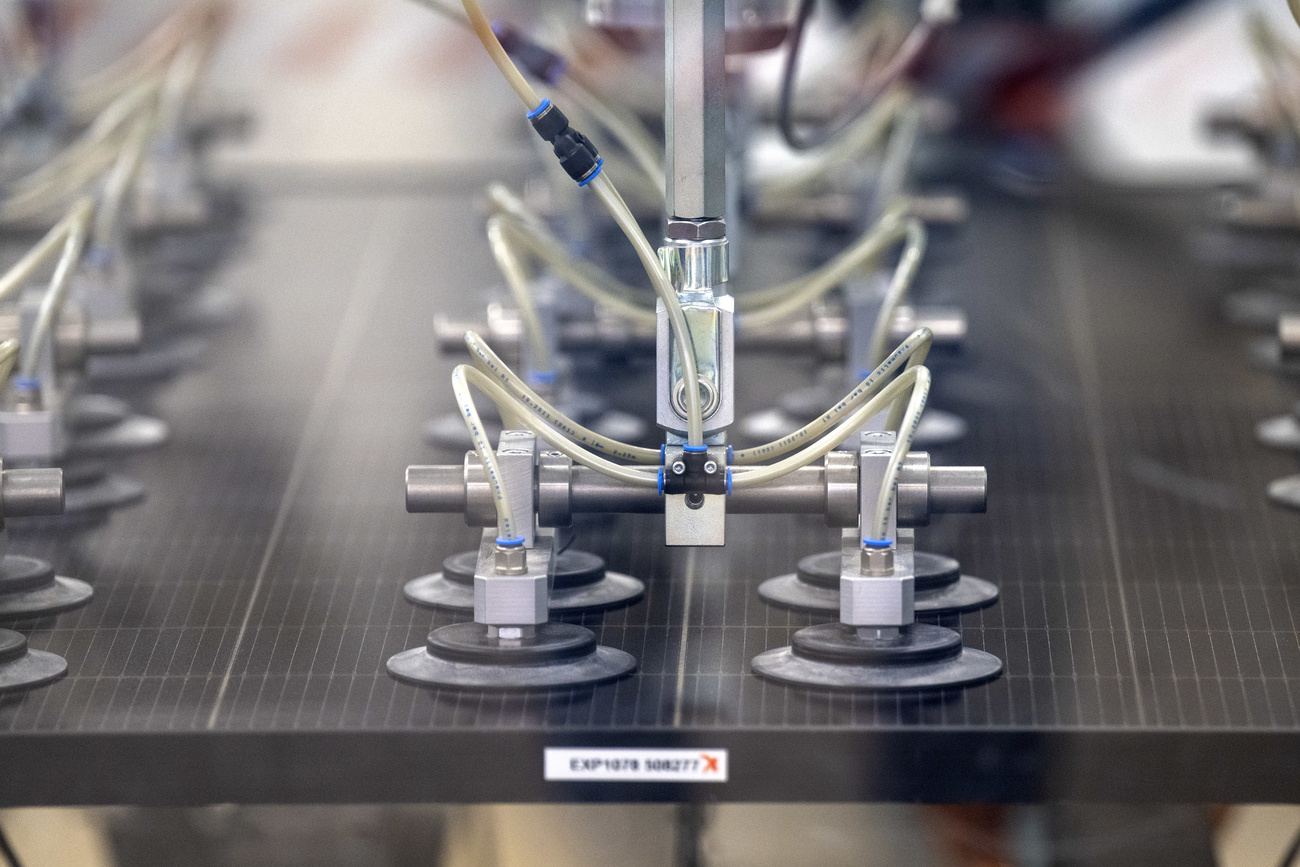
Switzerland’s drone dilemma

Switzerland prides itself on being the “Silicon Valley of Robotics” and pours public money into a cutting-edge research and start-up scene. In the age of drone wars, the military industry is a lucrative market for Swiss innovations – but engaging with it clashes with Switzerland's neutrality.
As Ukraine and Russia race to scale up their fleets of drones, the Ukrainian army can count on technology by a spin-off of one of Switzerland’s foremost technical universities. Auterion, a company co-founded in 2017 by Lorenz Meier to market an open-source drone autopilot he developed as a student at the federal technology institute ETH Zurich, announcedExternal link in June it had introduced “game-changing drone technology for kinetic military use to ramp up support for democracies looking to defend against aggressors.” Shortly before, it had relocated its headquarters from Zurich to Arlington, Virginia, a major base for the US military industry.
Meier, who now is the CEO, saidExternal link Auterion had “been quietly building” a new AI computer and flight controller for killer drones, which hadExternal link “already been proven in combat.” The key innovation of the so-called Skynode S system is that it enables drones to fly to hit targets even when confronted with electronic warfare measures like GPS jamming.

For Switzerland, such bold military engagement by a company that still has an R&D office in Zurich is problematic. Since 1910External link, the country is boundExternal link by The Hague Convention on neutrality to treat all parties to a conflict equally, and it has interpreted this obligation narrowly by prohibitingExternal link weapons exports to countries at war.
Swiss chips and mapping drones on battlefields
Auterion is not the only company of the Swiss drones ecosystem whose technology, intentionally or unintentionally, has reached the battlefield. SenseFly, a spin-off from the Federal Institute of Technology Lausanne (EPFL) that started outExternal link in the agricultural sector, was acquired by AgEagle, another US-based company. It now suppliesExternal link its tactical mapping drone eBee, upgradedExternal link with a camouflage skin for stealth, to the US military, which used itExternal link in the war in Afghanistan.
But this is not all. Chips by ETH Zurich spin-off U-Blox were foundExternal link in Russian Orlan-10 drones used in Ukraine. And an algorithm developed at the University of Zurich to steer drones in GPS-deprived environments eerily resembles an application promoted by Israeli defence contractor Elbit.
‘Tech for good’ – the official narrative
Swiss public agencies and universities such as ETH Zurich and the national innovation agency Innosuisse have facilitated cutting-edge research and tech transfer initiatives in the drone industry, giving riseExternal link to leading labs and more than a hundred start-ups. They have, however, consistently stressed that these are geared to a non-military use such as industrial inspections, cargo services or rescue operations.
The National Centre of Competence in Research (NCCR) Robotics, a strategic initiativeExternal link by the Swiss National Science Foundation that had a budget of CHF85 million External link($98 million) over 12 years, emphasisedExternal link a research focus on robots that would “improve the quality of life”. Its follow-up programme, the Innovation Booster Robotics funded byExternal link Innosuisse, aims atExternal link promoting knowledge-transfer along the entire value chain of robotics but does not support military applications, according to its leader, professor Aude Billard.

Blurry line between civilian and military
“ETH Zurich conducts research for the civilian sector,” the university’s vice president for tech transfer, Vanessa Wood, told SWI swissinfo.ch when asked about Auterion’s shiftExternal link from a company with a non-weapons policy to military supplier.
“We carefully examine in advance whether a project and the resulting findings and insights could also be used for military purposes and would therefore be subject to export controls.” But at a time when drones are being used in wars as cheap, tactical and efficient weapons, such claims ring increasingly hollow.

Drone technology cannot be neatly categorised as civilian or military per se, said Andrew W. Reddie, who runs the Berkeley Risk and Security Lab at the University of California. “Ultimately, these technologies are dual-use by definition, so there is a danger in terms of governments providing support for a core technology that might then be deployed,” he told SWI swissinfo.ch.
Export controls are hard to enforce on software, Reddie said, adding that once the technology exists, it can proliferate. “We see lots of examples where companies will go right up to the export control rule line, and that’s what they’ll sell to the foreign market.”
In general, software that qualifies as civilian or dual use can be easily developed further outside the country and used for military use. The export of materiel clearly identified as military such as grenades, or also dual-use hardware such as actual drones is much easier to control.
War in Ukraine: a business opportunity
Since Russia’s full-scale invasion of Ukraine in 2022, global military spending has risen at its steepest rate since 2009, with a 6.8% increase year-on-year in 2023 to reach $2,443 billion (CHF2,115 billion), according to data recently releasedExternal link by the Stockholm International Peace Research Institute. The US Department of Defense budgetedExternal link $2.4 billion for unmanned aircraft systems in fiscal year 2025, up fromExternal link previous years. The investments come amidst a strategy to build a Western counterweight to Chinese drone vendor DJI, which controlsExternal link more than 70% of the global market, according to Statista.
“There’s an overwhelming reliance upon one Chinese company to provide a lot of the drone capabilities in the Ukrainian context,” said Reddie. “So there has been a massive push in the West to replace those DJI drones.”
European venture capital firms in tandem have invested in dual-use technology like drones at record levels, Bloomberg reportedExternal link. Global militaryExternal link and civilianExternal link drone markets are projected to grow by 14% and 18% respectively over the coming decade according to market researcher Fortune Business Insights, with civilian drones increasingly beingExternal link remodelledExternal link for battlefield use.
Civilian drone applications struggled
In Switzerland, drone companies are strugglingExternal link with a lack of funding for later stages of development, according to a 2024 report by the Drone Industry Association DIAS. European providers are benefiting from military orders from Ukraine, DIAS board member Nathanael Apter told the NZZExternal link newspaper in July 2024. “Young companies such as Quantum-Systems in Germany or Delair in France receive an unexpected tailwind that Swiss manufacturers do not have due to neutrality regulations.”

More
Swiss researchers warn about autonomous weapons
This market logic propelled Auterion’s trajectory to military supplier, according to Romeo Durscher, an industry insider who served on Auterion’s US management team between 2021 and 2023. “We had a hard time initially gaining traction in the public safety space with Auterion,” he said. This includes sectors such as firefighting or security.
To attract investors, the company needed sales opportunities beyond purely peaceful applications such as fighting forest fires in California. “In order to get funding, you want to penetrate a market where there’s millions and millions of dollars,” Durscher said. “It was almost a no-brainer that eventually Auterion would make its way to the front in Eastern Europe.”
Likely tech spillovers to terror organisations
The company’s code of ethics, which has been adapted to reflect its new role as a weapons technology provider, now statesExternal link that Auterion only works with governments that are democratically elected and allow a free press. “It is a moral obligation for us to supply our products to liberal democracies so that they can defend themselves,” Meier said upon request. He refused to specify which countries qualify besides Ukraine and the United States.

But keeping such technologies out of the hands of authoritarian states or even terrorist groups is challenging. “As soon as your technology exists, there are risks of spillover,” Reddie, the Berkeley professor, told SWI swissinfo.ch.
“The reality is that the genie has unfortunately left the bottle,” said Romeo Durscher, the former Auterion executive. “Five years ago the coined phrase was we’re doing technology for peaceful purposes. Today we’re doing technology to protect democracy. It’s a feel-good statement that has, in my opinion, very little stance,” Durscher said.
Swiss authorities pass the hot potato
Innosuisse confirms that “goods originally developed purely for civilian use can, intentionally or unintentionally, be developed into military products over time”. The companies bear the responsibility here and must comply with the law, an Innosuisse spokesperson said. It is the responsibility of the State Secretariat for Economic Affairs (SECO) to enforce export controls.
Auterion’s employees in their Zurich R&D office work exclusively in the civilian business, the company told SWI swissinfo.ch. Legally, any developments in Switzerland are still subject to Swiss export control regulations, even if a company’s headquarters are abroad, the economics ministry confirmed.

More
Switzerland’s lead in AI drone technology raises ethical questions
SECO does not comment on individual companies but is aware of the matter, according to an emailed statement by the department’s spokesperson. The extent to which an ETH Zurich spin-off is bound by regulations beyond export control and sanctions provisions is for ETH Zurich to decide, the spokesperson added.
Even though Auterion was founded at ETH Zurich, “it is a private company”, said Vice President Vanessa Wood. “ETH Zurich has no influence over its business decisions.”
While authorities and universities are passing each other the proverbial hot potato, political parties struggle to agree on how to define the country’s neutrality when asked about Switzerland’s drone dilemma.

Heated neutrality debates among political parties
The right-wing Swiss People’s Party has launched an initiative redefining neutrality that wants to do away with any kinds of sanctionsExternal link towards countries at war – even if they are an aggressor such as Russia. The question arises “as to what extent and for how long Switzerland is still responsible for exported war materiel,” Peter Keller, deputy secretary general of the party, wrote upon request.
Laurent Wehrli, president of the Foreign Affairs Committee in Switzerland’s House of Representatives, declined to comment on the matter. The issue had nothing to do with questions of foreign policy but with security policy, he said in an emailed reply to SWI swissinfo.ch.
Priska Seiler Graf, a Social Democrat who heads the House of Representative’s Security Policy Committee, said Switzerland should remain a centre of science and business. “This means that the enforcement and control regime for the export of dual-use goods should be strengthened,” she wrote upon request.
While Auterion, a company that grew out of publicly funded research in Switzerland, is preparing for a future on the world’s battlefields, the Security Policy Committee of the Swiss Senate in August rejected a proposal to supply flak jackets and helmetsExternal link for civilian use to Ukraine – on the groundsExternal link of this “not being compatible with the law of neutrality”.
More
Edited by Virginie Mangin/vdv
This investigation was supported by JournaFONDS.

More
Newsletters

In compliance with the JTI standards
More: SWI swissinfo.ch certified by the Journalism Trust Initiative


































You can find an overview of ongoing debates with our journalists here . Please join us!
If you want to start a conversation about a topic raised in this article or want to report factual errors, email us at english@swissinfo.ch.